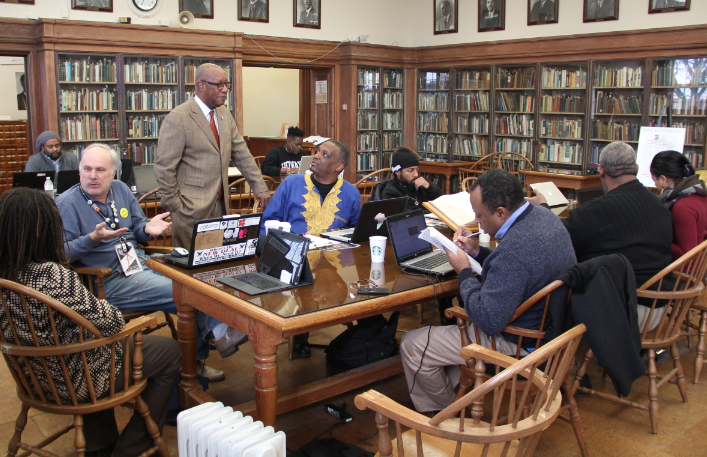Salvation Army

Cryston Cunningham, 24, says the Salvation Army helped her, so she wants to hepl othrs by collecting donations for fellow families in need in.
Photo by Janelle Berry, Howard University News Service
WASHINGTON — Around the holiday seasons when Christmas lights are up and holiday songs are blaring through the radio, everywhere you turn — from the front of department stores to large groceries — there are people with red kettles, ringing their bells.
They are the Salvation Army bell ringers: thousands and thousands of men and women around the nation who are collecting donations to help feed and clothe the needy.
They are people like Cryston Cunningham, who was only 23-years-old when last year she found herself with a baby, newly unemployed, homeless and no money to get any gifts for her little girl during the Christmas holiday.
Cunningham and her father had been struggling financially and emotionally when her stepmother and father divorced, and her father worked as a school custodian at her high school. When she finally left the house at 18 after graduating from Rocky Mount Senior High School, she found herself constantly in between jobs and in and out of different relatives’ houses for several years. Once she became pregnant with her now 1-year-old daughter, she realized that it was time to find a solution.
Now, a year later, Cunningham, 24, is grateful to be ringing the Salvation Army bell with a red kettle on her side, encouraging grocery store patrons to donate to families in need for the holidays for the second year in a row.
Cunningham works four to five days a week as a seasonal bell ringer during the holiday season in order to provide for herself and her daughter while she searches for employment and a permanent place to live.
“I like working with them [the Salvation Army],” Cunningham said. “It’s a friendly environment, and I like to make people smile when I’m out here ringing the bell and greeting people when they walk in and out of the store.”
Because of the Salvation Army, she can even give her daughter some Christmas gifts for the second year in a row through a holiday assistance program created by the Salvation Army.
The Angel Tree Program is a national holiday assistance program where a business, church, civic group or an individual can sponsor or “adopt” a child and purchase new toys or anything else they need that the parent is unable to provide for their family during the holidays.
The program, which was created over 40 years ago, currently impacts 14,000 children in the entire national capital area, which encompasses suburban Maryland and Virginia, as well as the D.C. metro area. In the D.C. region alone, the program currently impacts 5,800 “angels,” and impacted 6,300 the previous year. Several people throughout the D.C. community volunteer as bell ringers, or become seasonal paid workers like Cunningham every year to help the program help many families in need. This is the same program that Cunningham utilized last year, in order to gain some financial stability, as well as receive new toys and clothes for her daughter.

Cunninham happily standing next to her red kettle,
as she greets Safeway patrons.
Photo Courtesy of Janelle Berry, HU News Service
“I thought it was a good idea,” said Cunningham, when explaining how she was reminded of the program from a close cousin. “I heard about it when I was a kid, and my cousin does it for her kids, so I decided to work for them.”
During the rest of the year, Cunningham works with a government program called Maximus. The program provides her with $75 a week while she is looking for work, as well as checks for unemployment while also providing her the proper training and classes needed to apply for specific jobs. Cunningham is also currently in training to be a special police officer and lives with the who told her to sign up for the Angel Tree Program.
Although Cunningham is looking for a permanent full-time job, she expressed that if being a bell ringer would fit into her potential work schedule, she would continue to work with the Angel Tree Program during the holidays.
The Angel Tree Program normally starts on Nov. 9 and ends on Dec. 24, Christmas Eve. The Salvation Army has 200 bell ringers and 250 red kettles to receive donations throughout the season. Seventy percent of the bell ringers are compensated while 30 percent are volunteers from organizations, businesses, churches, families or individuals.
“Some families need extra income during Christmas time, and this program can get it,” said Media Specialist for the D.C. Region of the Salvation Army, Ken Forsythe. “We find out what the needs are early in the year, then in early October, families come forward and tell us what their kids want for Christmas.”
The families make a wish list of what their children want for Christmas which the sponsors receive and are encouraged to spend around $85 on gifts for children in need. The sponsors receive a tax-deductible for participating in the program as they spend for their desired level of generosity, according to Forsythe.
“Our goal is to meet the need of every child,” Forsythe said. “We work however we can to make sure that no child is left without anything on Christmas morning.”
The Angel Tree Program will begin distributing toys for the season in a ceremony on Dec. 17 at an undisclosed area.








